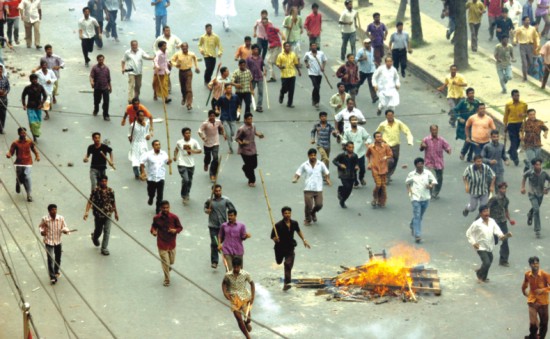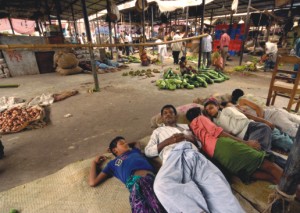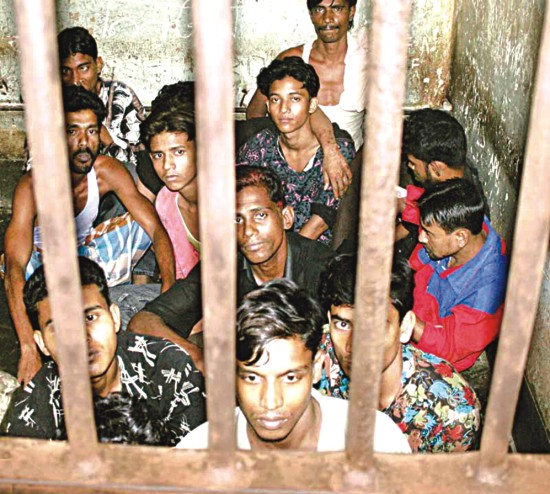|
Special Feature
October Flashback

Imran H. Khan and Elita Karim
On October 27, 2006, Bangladesh witnessed the end of the four-party coalition rule. As soon as Prime Minister Khaleda Zia stepped down after her speech at 7 p.m., the country plunged into chaos as Awami League (AL) and BNP activists took to the streets in a display of democracy that we have learnt so well from our world powers, “Muscle Power”. The scenes of street fights that erupted were reminiscent of battles fought in medieval times. Opposing groups collided brandishing crude weapons like knives and oars, accompanied by frenzied voices raised in battle cries that were totally incongruent with the 21st century where gang battles are fought with swords and pikes in the streets of New York.
In scenes that were not dissimilar to battles fought in the animal kingdom for leadership, territorial rights or possession of a female, one party gave chase to another, and if and when a few stumbled and fell they were jubilantly caught and carried back to the pack giving chase and “suitably punished”, resulting in beaten and battered bodies adding to the statistics. It could have been a page from Sir William Golding's <>Lord of the Flies<>. What happened in the streets of Dhaka that frightful week showed that the foreign cars we parade, the malls we show off and all the culture and religion we spout, are nothing but an exterior (a thin one at that) and once it is scraped off, our bigotry and violent nature surface. We might very well be living in the dark ages.
Causing a political chaos just to prove a statement is now a very normal element of life for the people of Bangladesh. Yet, the clashes and the sudden closing down of the country came as a shock for many in the country who weren't prepared to take such a blow from their leaders. Dhaka was totally cut off in what the Awami League-led 14-party termed 'Dhaka Siege Programme' from October 28 morning, demanding implementation of their electoral reforms agenda.
The passengers of all Dhaka-bound buses were forced to get off at various intersection of the city. Most of the bus companies withdrew their vehicles from the streets anticipating violence on the eve of the hand over of power. At Kachpur, after hours of waiting, tired and panic-stricken passengers got off from the buses and decided to make it into Dhaka on foot. Hundreds of passengers were seen walking down the Jatrabari-Gulistan road luggage in hand, always on the look out for a possible mode of transportation to take them to their destinations or simply carry them a little ahead. Some rickshaws and cycle-vans were available which were carrying several frightened and fatigued passengers, at abnormally high prices. A small time musical group, making its way back to Dhaka after doing live shows at a private Eid party in Chittagong, was out on the streets carrying luggage and instruments for hours at a stretch. Finally, they found a pick-up truck and practically begged the driver to take them to Dhaka.
All this while, activists of both the parties were seen patrolling the streets with sticks and stones (being the most common of weapons) in hand in search of rival party men. In the course of crossing over to the city, several incidents of mugging had also taken place. Political rioters belonging to both the AL and BNP parties snatched away money, jewellery and other valuable items from the abandoned passengers. It was helpless situation for the passengers, since they had nothing to do but give in to the clutches of the hooligans. It was a indeed a night of celebration for many criminals in the country.
Riad Hussain and Shireen Quadir, after spending Eid holidays with family in Chittagong, were making their way home to Dhaka in their private car, when they were stopped and were asked to go back since riot had broken out in the city. “People had become crazy!” says Shireen. “It was like entering a war zone of some kind. People were carrying sticks and weapons and setting cars on fire. It took us around 11 hours to reach Dhaka from Chittagong.”
Bangladesh railway continued its services but the trains were forced to halt at different places including Khanabari, Brahmanbaria, Narsingdi, Doulatkandi, Azampur, Ijjatpur, Bhawal and Gazipur, causing delays of no less than three hours. At Badamtolighat, the number of passengers using the waterways was abnormally low last week. Steamer Ostrich, which plies between Dhaka and Khulna and has a the capacity of 800 passengers carried only 200 that week.
In the port city Chittagong, AL backed City Mayor ABM Mohiuddin Choudhury called a hartal, closing down the port for an indefinite period of time. With 30 ships waiting for loading and unloading, the country's premier Chittagong seaport faced one of the worst congestions.

Passengers making into Dhaka on foot when the Dhaka-bound buses were forced for stop because of the Dhaka siege programme undertaken by the 14-party
Private and nationalised commercial banks partially operated though the transactions were very low. Some private business houses operated keeping the shutter of the front door down. The operation of the stock exchanges remained suspended. Bangladesh Bank did not receive any check from commercial banks.
Garment factories faced tremendous difficulties as the banks never give any waiver of high interest rate even though the garment export was temporarily hampered due to the political disturbances in the country.
As a chain reaction, the general public suffered thoroughly during the days when the country was at a standstill. Most markets and commercial places closed down. The market areas in the main city areas were left almost empty. “I had to buy essentials from supermarkets, instead of the market place in Uttara where I usually get my weekly supplies of vegetables, rice and lentils,” says Celina Ahmed, a housewife living in Uttara. Because of the road blockages, trucks and vehicles could not make it to the city, unable to make the deliveries to the vendors at the different retail spots in the city.
I
n Dhaka, Karwan Bazar, otherwise a buzzing kitchen market, remained desolate as both the traders and customers opted to stay home. Fortyfive-year-old Al-Amin still charges Tk 23 for 1 kg of potatoes, instead of Tk 19 - Tk 20 at the market place in Mohammedpur. “Those few days were very hard on us,” says Al-Amin. “We had run out of stock. Even though the deliveries were made to us eventually, it was too late.”
Most of the vegetable markets in the city had a common complaint. Due to the transport blockage, the deliveries were made belatedly and that too after bribes going passing through several hands in some cases. “It is quite natural that the prices of the goods, materials and raw materials will rise drastically,” says Mohammad Jashim, a wood and cane trader in Karwan Bazar. “This will persist for a while, till the situation gets back to normal in the country.”
Dhaka Medical College Hospital (DMCH) was packed with over a hundred patients a day, hurt in the clashes at Paltan and Baitul Mokarram in the capital between the activists of the 14-party opposition combine and the four-party alliance, especially from BNP and Jamaat. According to the on-duty doctors at DMCH, only two wards could be allocated where over a hundred injured patients had to be crammed in. Shortage of blood, medicine and beds at DMCH turned acute. There was a point when several patients were losing blood and at least 50 bags of blood were urgently required.
The authorities were having a hard time handling the chaotic situation in the wards crowded with more than one
 Otherwise, buzzing kitchen markets, vegetable markets in Dhaka remained desolate as both the traders and customers opted to stay home |
patient on the same bed along with hundreds of visitors, journalists, camera crew from TV channels, members of law enforcement agencies and curious citizens.
This time, the wrath of the rampage did not even spare senior ministers and lawmakers of the parties as their houses and offices were attacked. Tires were seen burning in trouble--prone areas such as, Jatrabari, Shyampur, Gulistan, Purana Paltan, and in the worst places, the tires were attached to the vehicles. There was chaos as armed activists of both the political alliances erratically blasted bombs and ransacked their opponent's strongholds.
Harassment, a common occurrence at the best of times, ran rampant. There were people being arrested for simply attending rival party meetings. One English proverb goes like this: “It's an ill wind that blows no one any good.” It means that in any situation there is always someone who wins. Well, if there were any winners during the brawl last week they were the brokers, who in the hundreds were found hunting down poor parents, wives and family members of the (in most cases) innocent arrestees. Akkas Miah's crime, he claims, was attending an AL rally last Sunday. He was asked by the police of Bhashantek outpost to report to the police station that evening and on doing so was arrested and sent to court the following day. His wife, Jotsna Begum, bewildered at finding her 50-year-old husband arrested, had no option but to pursue brokers at the court and beg them to get a release order for her husband.
Though the BNP led four-party coalition whimpered to a close, the bloody aftermath will live forever not just in the hearts of the people who lost dear ones during last month's clash, but in all of us who pride ourselves in our rich heritage, vibrant culture, peaceful farmers and our pristine beauty.
Some highlights of the fate3ful days
* 29 people dead
* 2,000 hurt and wounded (many by bullets)
* 2,000 arrested
* 44 imposed in many places
* Mob rule prevailed with slogan chanting agitators
* A sense of utter insecurity amongst city dwellers
* Skirmishes in numerous streets
* Paralysis of port city Chittagong
* Dozens of vehicles set on fire
* Road blocks
* Uprooted rail lines
* Trains set on fire
* Chaos, chaos and more chaos
Back to the State of Nature
Nader Rahman
Thomas Hobbes, the 17th century philosopher, famously spoke of a “state of nature”, where lawlessness and chaos prevailed. He said that must have been what life was like before “civil society”. To sidestep such a phase in the possible history of mankind he suggested that people enter into a “social contract”. A “social contract” would be when people willingly submit themselves to a sovereign whose only purpose would be to provide “peace and defence” for the people. While that theory has long been criticised and mocked for its implausibility, owing to the fact that the ruler could essentially do anything he wanted as long as he provided “peace and defence” for society. If one were to leave everything behind, corruption, inefficiency and generally everything that the BNP-led coalition did wrong and just asked them to provide the “peace and defence”, even then they would be viewed as colossal failures.
It is a bold statement to make, but in the wake of the recent political turmoil and the subsequent riots it is more fact than fiction. Let us create a hypothetical situation, the government was asked simply to enforce and provide peace and defence for the people of the country. Provided they do that we (the people of Bangladesh) would look the other way to any abuse of power that occurred after fulfilling their duties. If that were to be the case then the government would have a lot to answer for. Just before they handed over power to the caretaker government the country was turned on its head with riots that could have put some African civil wars to shame. After the smoke had cleared and the fires were put out we were left with 29 dead and thousands injured. That was the closest that we got to a “state of nature”, the government failed miserably. We the people of Bangladesh would have looked the other way to all their misdeeds if all they did was provide peace and defence, but they did not. In the end we are left with the tag of most corrupt nation in the world, dozens dead and thousands injured.
For about three days from October 28 to 30, Bangladesh was turned into a battlefield, members from all the major political parties clashed with each other. But why? Why is it that our country came to a standstill and people lost their lives? In a country of 140 million people we have grown accustomed to an “accepted number” of deaths in political violence, but why is that so? Are lives worth less in this country? The truth is that there are no real answers to any of the questions. The political parties believe it is in the best interest of the people if they create a state of chaos, if in the process a few people die, then so be it.
The troubles flared up as the government was about to announce the chief of the caretaker government. The opposition decided the best way to show their displeasure at the choice of KM Hasan was to agitate. And agitate they did. In Dhaka they marched by the thousands eventually ending up in Paltan. And then all hell broke loose as party members of the government and the opposition met face to face. Shops were ransacked and burnt as people fought out possibly the bloodiest face to face battle between the parties. The scenes were of chaos, as rubber bullets were fired by the police and real ones were fired by the mob. On the first day alone 12 people died and the scenes of Paltan were mirrored across the country, the only difference being in size. The following day the number went up to 21 and finally two days later the numbers stood at 29 dead.
What can be said for the rule of law in a country that allows people to be shot in the head and beaten to death with oars and sticks in front of policemen who do not care? Thirty-five people surrendered their lives over who should lead the caretaker government. What a colossal shame, that families should be torn apart and blood spilt just over what is essentially to be an unbiased man who leads a country up to the general elections.
Just as bad as the killings was the fear that struck into the heart of the average man. T.V. channels all broadcast images of people dancing around the body of a man who was beaten to death. That will forever be the iconic image of the three days to terror that culminated rather interestingly on Halloween.

Mass arrests are a common form of harassment during times of political chaos
Aside from the deaths and injuries there were other casualties. In Dhaka alone there were blanket arrests that detained more than 200 people in two days. That only added to an overwhelming sense of national insecurity. Mass arrests were one of the BNP led coalition's party tricks, they seemed to have perfected the abuse of simple human rights. Even though they (Dhaka Metropolitan Police) arrested more than 2,000 people in two days they only brought 650 of those people before the Court of Chief Metropolitan Magistrate. Most of the rest are still languishing in jail or have paid hefty bribes to get of charges. One case of harassment which particularly caught the eye was the story of 15-year-old chicken seller Shumon Mohammed. His mother sent him out to get some food when he was picked up. The police demanded Tk 1,000 for his release when his mother could only come up with Tk 70 it enraged the police even more. Shumon received a sound beating and was sent to court the next day on trumped up charges. These are the stories we have to live with--bullets to head and beatings for the innocent.
Things got so out of hand that even Amnesty International (AI) strongly condemned the wave of political violence and asked leaders of all political parties to take immediate and effective measures to ensure that no further violence would be committed by their party men in the run-up to the next general elections. They even asked for impartial and immediate investigations into the acts of arson, killing, ransacking of homes, shops and offices. In a public statement they said “All political parties must promptly address every report of involvement of their members in these acts of violence and cooperate fully with measures to ensure that those responsible are brought to justice”. Only time will tell how seriously we take suggestions but for all intent and practical purposes, most of us know nothing will be done.
At the end of the day, people gave their lives and innocent people are still languishing in jail, all over one little position. The poisoned chalice has been handed to Prof Iajuddind Ahmed. It is now only a matter of time till he drinks from it.
Copyright
(R) thedailystar.net 2006
|
